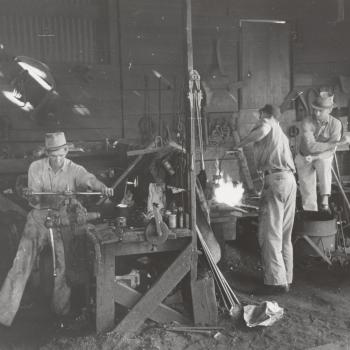The Working Catholic: Social Doctrine Part Thirteen, Poverty by Bill Droel
It’s published in Wall St. Journal (4/30/23), so it must be true. It’s an essay about wages by Michael Lind. He begins with a quotation from Adam Smith (1723-1790), a theorist for modern capitalism. For capitalism to thrive, Smith says employees must get a family wage.
Family wage is a principle of Catholic social doctrine. A slogan from Unite Here, a union of hotel workers with headquarters in Manhattan, is a good paraphrase of our Catholic principle: “One Job Should Be Enough.” Our U.S. bishops described a family wage in their 1919 Program of Social Reconstruction. Pope Pius XI (1857-1939) has it in his 1931 encyclical Reconstructing the Social Order, as does Vatican II (1962-1965). St. John Paul II (1920-2005) also writes about it. The idea is that one wage earner should be paid at least enough to support a family, including its education needs, some funds for leisure plus for modest savings. The amount of that wage can differ by location and by the type of job. A family can have a second wage earner, but the family’s survival should not depend on that arrangement. St. John Paul II emphasizes that the measure of a society’s justice is its wage structure. All other compensations and social policies and management plans are accessories.
Lind says that our economy does not abide by the family wage principle but uses a model he calls low-wage/high-welfare. Many employees get inadequate pay but stay afloat through Earned Income Tax Credit, food stamps, housing vouchers and more. In other words, as Lind writes, “taxpayers pay to rescue workers whose work does not pay enough.”
Lower wages allow for lower costs which benefit some consumers. For example, middle-class and upper-class families are winners in the low-wage/high welfare economy when they hire housekeepers or landscapers. The losers are taxpayers and of course the underpaid.
Matthew Desmond in Poverty, By America (Crown, 2023) agrees. Poverty resists elimination despite charitable endeavors and social welfare because some people benefit from the poverty of others. “Poverty is an injury, a taking,” says Desmond. Normally, people are unaware of how their lifestyle depends on the perpetuation of poverty. However, Desmond’s book makes it plain, using many examples including our tolerance for insubstantial wages.
There’s a corollary to the principle of a just wage. Because an employee agrees to a sub-level wage the criteria for justice is not met. Adherence to this aspect of Catholic doctrine means, for example, that a pastor cannot morally pay a teacher less than a just wage because the teacher understands the job as a vocation. The standard is objective, not subjective. That standard does, however, take into account that a just wage in a small town, for example, might be lower than a comparable wage in Manhattan.
There is plenty of room for debate as to how to achieve just wages. Lind mentions collective bargaining, but he is not happy about a bargaining unit at one Starbucks and then a different unit at the next Starbucks. He suggests sector or multi-employer bargaining might be better. This idea is like the Catholic idea of an industry council plan. To be continued…
For more on this topic get St. John Paul II’s Gospel of Work edited by Bill Droel (National Center for the Laity, PO Box 291102, Chicago, IL 60629; $8.)










